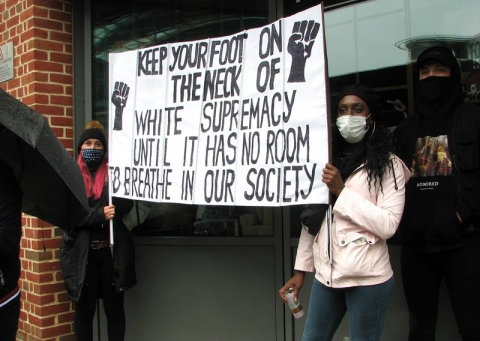
Main navigation - Library
Secondary Menu - Library
Secondary menu
Search suggestions update instantly to match the search query.
Standing firm in power and pride

As write Alice Walker observed: “The most common way people give up their power is by thinking they don’t have any.” It is a great trick that rulers play over the ruled to convince them they have no power. Black people have a long and proud tradition of solidarity - of resourcing one another and standing together and creatively resisting, circumventing and eventually overturning the laws, social movements and political attacks that seek to diminish them. Now more than ever, this is needed.
The lasting legacy of Black power
From the rebellions and political movements that saw an end to institutionalised slavery in most countries, the consistent application of agency, creativity and courage on both sides of the Atlantic has shaped our modern society. The latest movement against racial discrimination following rollbacks in equality and diversity legislation has been the systematic boycotting of businesses that discriminate, exercising the power of the Black dollar to motivate corporate responsibility and reinvest in Black-owned businesses. In Britain, the introduction of the Halo Code calling out discrimination against Black hair and other forms of Black cultural self-expression in schools and businesses, amid calls for the Equality Act 2010 to be extended to specifically outlaw discrimination based on cultural hairstyles.
This tradition of using economic action as a tool of empowerment has deep roots, from the mass boycotts of buses in the US to the 1963 Bristol Bus Boycott that challenged racist hiring practices.
Fierce compassion and boundless creativity
Yet not all power comes from protest. Claudia Jones established the Notting Hill Carnival as a celebration of culture and pride, realising that it was necessary to demonstrate publicly the cultural diversity of the recent Caribbean immigrants and foster an active counter-narrative to the hate speech being habitually recycled by the media.
A call to unity, community and communication
At a time when systemic inequalities are on the rise, predictably giving rise to an increase in discrimination and hate as people squabble over increasingly sparse resources without asking just how those resources have become depleted, unity in the face of 'wedge issues' deliberately introduced to fragment communities and undermine resistance, unity, pride and creativity are once again essential. We must apply the lessons of past generations to the present and build on traditions of community and communication to develop a powerful counter-narrative capable of rebalancing society.
Rediscover Black British Heroes of the 20th century
You can read more about the Black British heroes of the last era of race riots here on the Library blog.

